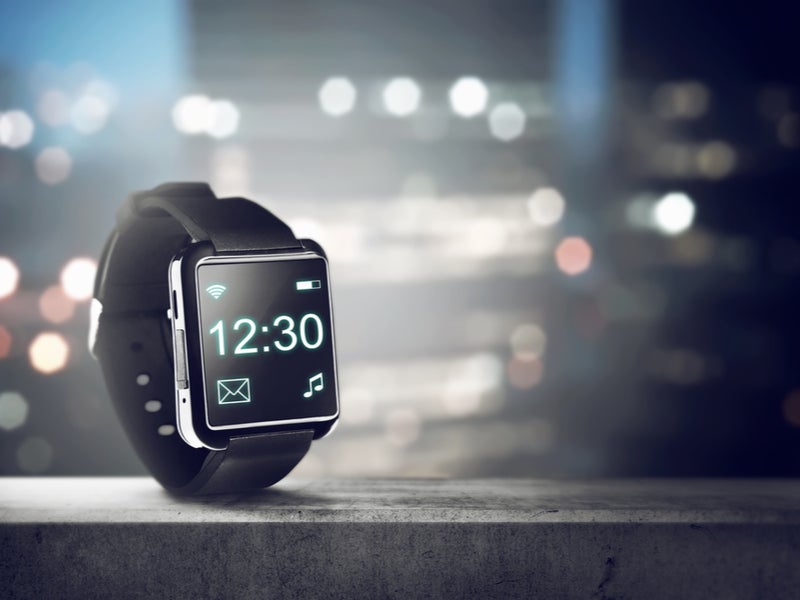In 2019, the smartwatch market was worth $17bn. It will become a $64bn industry by 2030, according to GlobalData forecasts. The growth is mostly attributable to the addition of features such as cellular connectivity, health and fitness monitoring, and interoperability with other connected devices. While these features presently add to user convenience and generate demand, smartwatches will require a killer use case if they are to become indispensable to consumers.
Listed below are the key technology trends impacting the smartwatches industry, as identified by GlobalData.
Custom silicon
The efforts to make smartwatches self-contained are leading to the development of custom chips. Smartwatch vendors are increasingly focusing on in-house development of purpose built SoCs to offer improved battery support, faster app performance, and wireless connectivity. Apple, Samsung, and Huawei are leaders in this space with the S-series, Exynos-series, and Kirin A1 SoCs, respectively. Meanwhile, vendors that do not have custom chips, such as Fossil and Tag Heuer, are turning to Qualcomm for the Snapdragon 3100 SoC.
Qualcomm is planning to launch the new Snapdragon 3300 in 2020. Although Qualcomm remains the key chip supplier to Wear OS-based vendors now, its future looks uncertain, as Google’s custom chipset for Wear OS smartwatches is expected to arrive in 2021.
Conversational platforms
Conversational platforms are bringing voice control to smartwatches. These platforms employ a variety of AI technologies – including speech recognition, natural language processing (NLP), context aware computing, and machine learning – to enable human-like voice interaction. Users can access news, send messages, track exercises, play music, and make flight reservations using these platforms, without the need to access apps manually.
Apple’s Siri, Samsung’s Bixby, and Google’s Assistant are the prominent conversational platforms in smartwatches. Amazon is also pushing into this space, partnering with Samsung, Fitbit, and Huami to integrate its Alexa assistant with various smartwatch models.
Consumer IoT
Smartwatches are becoming compatible with other smart consumer devices. Controls for automated home appliances (such as lights, thermostats, TVs, and security cameras) are already available on smartwatches, while connected car tools are starting to arrive. For example, the new Hyundai Creta comes with a smartwatch-integrated app that gives users access to controls (such as sunroof, seat ventilation, and temperature), and alerts (on speed and vehicle status, among other things). Advances in sensor technologies and software capabilities will make smartwatches compatible with more devices in the coming years.
Data and analytics
Smartwatches generate large volumes of data that requires storage and real-time analysis. Given that they have limited storage and processing capabilities, apps such as Apple Health, Google Fit, and Samsung Health synchronise user data on the respective vendors’ cloud servers. Analysing the server-stored data enables the vendors to improve their products, services, content, and advertising. However, given privacy and cybersecurity concerns around the exchange of data between smartwatches and cloud platforms, vendors are increasingly providing on-device computation (edge computing).
GlobalData expects more edge computation on smartwatches in the coming years. That said, vendors will still need to transfer some user data to cloud servers for broader analysis and research purposes.
Cybersecurity
Smartwatches are internet-connected devices that exchange data with paired smartphones and cloud platforms frequently, which makes them susceptible to cyberattacks. In December 2019, security flaws were found in the cloud platform of Chinese location tracking company ThinkRace that put 47 million kids’ smartwatches at risk of being hacked. This incident demonstrated the need for robust security software at all layers of smartwatch services. Studies conducted by Kaspersky and Sophos have also highlighted the importance of effective physical security on smartwatches.
Regulators in Europe and the US are compelling vendors to adopt privacy-by-design techniques during product development and privacy-as-a-service over the lifecycle of products. In compliance, vendors are offering users the ability to store their data on-device, protected with app passwords or single sign-in unified IDs.
Battery life
The capacity of the lithium-ion batteries used in smartwatches is a few hundred milliamp hours (mAhs), while the average smartphone boasts over 4,000 mAhs. This deters smartwatch vendors from including smartphone-like apps that are heavy users of battery power. They are also restricted by the limited physical space on smartwatches to add more or bigger batteries. Solar-powered batteries, zinc-carbon batteries, and body heat-powered devices are being evaluated, although the reliability and longevity of these options are still unclear.
The Smart2Go initiative, part of the EU’s Horizon 2020 research and innovation program, is a promising project that could provide a consistent power supply to smartwatches in the future. It aims to develop an autonomous energy supply platform that will eliminate the need for charging devices through the combination of a powerful battery and appropriate energy-harvesting technologies. Fraunhofer FEP, the organisation leading this initiative, believes the platform could be used to power wearables, including smartwatches.
This is an edited extract from the Smartwatches – Thematic Research report produced by GlobalData Thematic Research.








